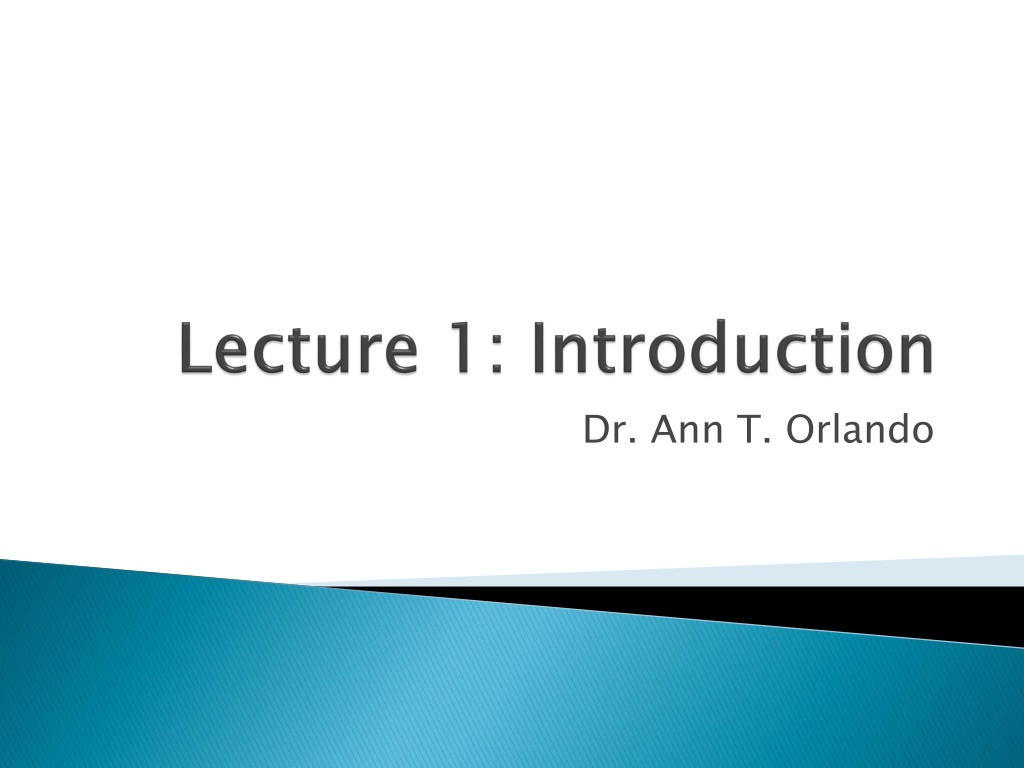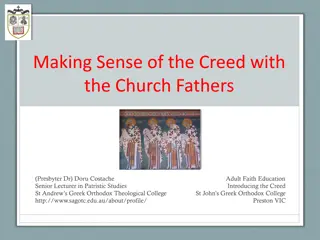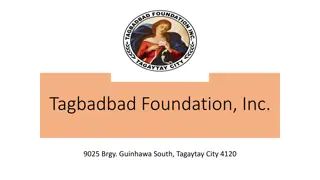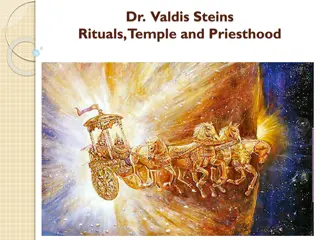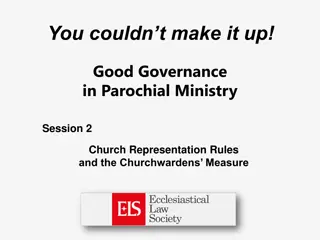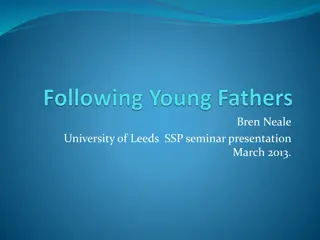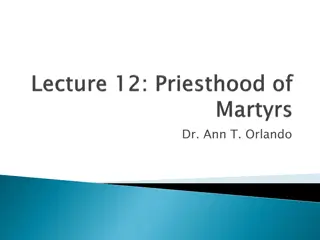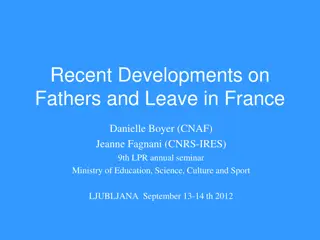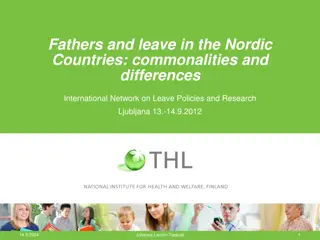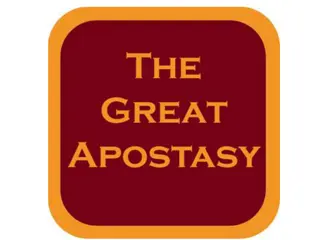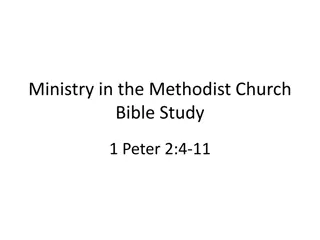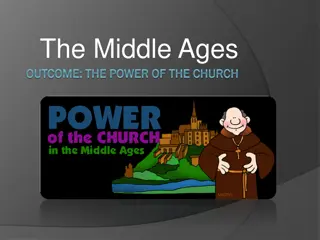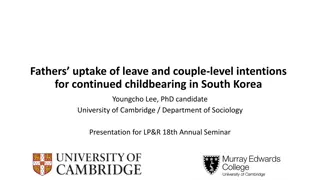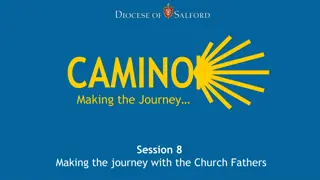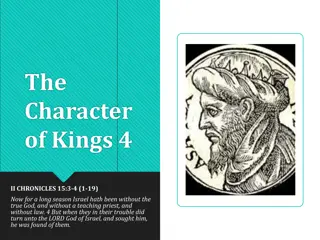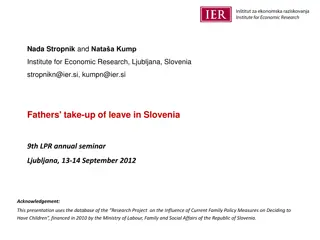Exploring the Meaning of Priesthood with Church Fathers
Delve into the understanding of priesthood by Church Fathers such as St. Augustine, focusing on texts like Psalm 132 (133). The course emphasizes class attendance, engaging discussions, and submission of bi-weekly papers to enhance comprehension. Explore the ancient meanings of 'priest' and sacrificial concepts in theological works to deepen your spiritual awareness.
Download Presentation

Please find below an Image/Link to download the presentation.
The content on the website is provided AS IS for your information and personal use only. It may not be sold, licensed, or shared on other websites without obtaining consent from the author. Download presentation by click this link. If you encounter any issues during the download, it is possible that the publisher has removed the file from their server.
E N D
Presentation Transcript
Deeper study of one Patristic author or period? Study of a specific text? Pastoral application? Let me know and we will try to accommodate that
Deeper appreciation of Church Fathers exegesis Deeper understanding of the priesthood A robust bibliography Understanding informed by your insights A personal (spiritual) awareness of connection between my priesthood as a baptized Christian and suffering (what am I sacrificing??)
Course Structure and Requirements St. Augustine, Psalm 132 (133) Meaning of word priest in antiquity Sacrifice in City of God and The Trinity
Objective: explore how the Church Fathers understood the meaning of priest Requirements Class attendance Participation in weekly discussions MANDITORY grade) Papers submitted bi-weekly (the other 50%) No big paper Although I would be very happy for you to submit one No final NB This is a work in progress. I reserve the right to amend the syllabus as our study progresses MANDITORY (50% of (50% of grade)
Focus on primary readings Select specific theme Graded based on Theme Research (careful reading of primary sources) Discussion (insightful analysis) Composition Due on discussion day
Morning hour Class discussion of texts read previous week Each class member will lead one or two discussions Afternoon hour Lecture Background on texts for coming week Class lectures found at http://web.mit.edu/aorlando/www/FathersOnPri esthood/ Most primary readings can be found on BC library course reserves website for sjsst615.01.
Bible, preferably LXX for Old Testament Augustine selections primarily from New City Press translations Most others from Fathers of Church (CUA) translations Please bring a Bible to class each week Greek NT and LXX if you have it
Idiosyncratic Selected Texts were NOT part of Introduction to Patristics I Clement Didache Ignatius of Antioch Tertullian (except On Baptism) John Chrysostom, On Priesthood Augustine, Confessions
What is the sacrifice that is offered Who and how is one authorized to be a priest What is relation of priest to society Categories of priesthood Jesus Christ Old Testament priesthood and its relation to Jesus Christ Ministerial priesthood: Bishops, priests and deacons Their relationship to Jesus Christ Their relationship to faithful Baptized priesthood: martyrs and faithful Their relation to Jesus Christ And the ministerial priesthood
Built on model of beard of Aaron Priesthood of Christ Apostles Ordained ministers Martyrs and Laity From Psalm 133:2 (LXX 132), reflecting on Leviticus 8:22 It is like the precious oil upon the head, Coming down upon the beard, Even Aaron s beard, Coming down upon the edge of his robes.
Augustine used the Old Latin version of Scripture, based on LXX. Thus his numbering of Psalms at variance with usual English editions Written 392-418 Analysis of all 150 Psalms Key is understanding Psalms in the light of Christ and His Church Format is treatise and homiletic Because of their mixed style and purpose, Erasmus (16thC) referred to them as enarrationes For some Psalms, Augustine wrote more than one sermon or treatise. These are referenced as, for example, En. Ps 21 [1] En Ps 21 [2] English translation in WSA requires 6 volumes, making this one of Augustine s longest works
Psalms 119-133 (120-134) Both Christians and Jews in antiquity recognized the unity of these Psalms Augustine likely wrote his homilies on these Psalms between 405-410; But likely written and delivered in less than a year Perhaps even preached on successive weeks Augustine encourages his audience to think of themselves in a valley, and their heart in a valley of tears The ascent is to the peaceful, stable Jerusalem And the pilgrim Church is following where Christ and the martyrs went before them, and indeed lead them Christ and the martyrs are singing with the pilgrims
Focuses on unity in opposition to Donatists Encourages unity of all people in Church: priests, monks and laity Psalm 132 (133) refers to Ex 29.7 Augustine uses this as a way to discuss priesthood of Christ and His followers in the Church Note importance of martyrs
Augustines immediate concern is the Circumcellians Circumcellians were the militant, terrorist arm of the Donatists Planned assassination of Augustine (see Possidius, Life of Augustine, 12) Did attack and wound Possidius, Catholic bishop of Calama Circumcellians led an ascetic life but disparaged Catholic monks for their peaceful non-military attitude Circumcellians hoped to die as martyrs in violent conflict with Catholics and Roman officials
Evenly divide class for bi-weekly papers Argote Maurici Papers due on: Feb 1, Feb 15, Mar 1, Mar 22, Apr 5, Apr 26, May 10 Montero Zinger Papers due on: Feb 1, Feb 8, Feb 22, Mar 15, Mar 29, Apr 12, May 3 NB All have a paper due next week NB All have a brief homily due May 10 Who wants to lead discussion which week? Decide and fill out sheet after lunch
Priest etymologically from German via Latin, presbyter, via Greek, presbyteros Ancient Latin and Greek have basic meaning of elder, or a community leader, which may or may not have a religious connotation Our use of priest includes more precisely the liturgical connotations of Latin, sacerdos Greek, hiereus
Greek word for priest or one who is associated with a temple and religious rituals and sacrifice In Stoicism a priest was a wise man whose sacrifice was his study of the cosmos In the LXX: Genesis first (only) use at 14:18 in reference to Melchizedek; only other references are in Ch 47 concerning the Egyptian priests First used in Exodus 2:16 describing Jethro as a priest of Midian; Who are the elders (presbyteros) and who are the priests (hiereus) in Exodus 19 read Ex 18 and 19 Aaron and his sons commissioned as priests Ex 28
In Philo of Alexandria, priest and Word (logos) are one See On Drunkenness (Ebr 126-128) and The Special Laws XVI (80- 92) Fusing of Stoic priest with Levitical priest In NT In Gospels, priest refers exclusively to Levitical (Temple) priesthood; not to Jesus or His followers Hebrews is the primary study of Jesus as priest 1 Peter 2 refers to followers of Jesus as being a priesthood (hierateuma) Book of Revelation is only place where followers of Jesus (martyrs) are called hiereus High priest (Archiereus) First mentioned in Lev 4:3 and Joshua 22:13 Figures prominently in I and II Maccabees as well as New Testament Associated with political ruler and appointed by king
Means elder But can also mean the president of a college In Exodus, Moses calls the 70 leaders from each tribe the elders Oversee sacrifice of passover lamb for each family (Ex 12:21) Representatives from all the people, in distinction to Levitical (inherited) priesthood In Gospels refers to elders of Jews (Pharisees??) In Acts, Epistles and Revelation associated with followers of apostles as leaders of Christian communities (1 Peter 5:1, Peter refers to himself as a fellow elder)
Literally means overseer, protector, watcher, patron Greek gods were sometimes said to be episkopos when they were acting as protectors and patrons to humans In Cynic philosophy, an episkopos was a wondering preacher calling men to judgment for their sins Also used as a title for a municipal office of a magistrate (judge) In LXX God is referred to as episkopos as a judge of men (see Job 20:29, Wis. 1:6) Philo describes Moses as episkopos
Christ is called episkopos in 1 Pt 2:25. Presbyters (elders) as episkopoi in Act 20:28 and 1 Pt 5:2 Episkopos as a distinct office in 1 Tim 3:1 See role of presbyters in 1 Tim 5 as teachers and preachers
Hierov, or temple, the place where (pagan) priest offers sacrifice. Prior to 2ndC BC (Maccabees), heieron, not used in LXX. Rather God resides in ark, tabernacle Solomon builds a house of God (regardless of how it may be translated in English) Josephus frequently refers to Herod s construction as the Temple New Testament frequently refers to Temple in Jerusalem
Sacer: someone or something given to the gods Sacerdos: literally, one who does a sacred act No hereditary Roman priesthood All Roman citizens are priests in so far as they preside over their domestic household cult Sacramentum: Something given in bond or oath to the gods which makes the giver sacer Related to consecration
Pontifex: priest of high ranking college of priests in Rome Responsible for Roman calendar Responsible for family civil law such as adoptions and inheritance Recording events (births, deaths) Pontifex Maximus: Leader of the pontifex college of priests Elected office With Julius Caesar, also becomes a political office
Basic definition: A priest is a person authorized to perform religious rituals Most important religious ritual: offering sacrifice This is true in pagan antiquity, ancient Judaism, Christianity Greek, thysia Latin, sacrificium
First mentioned in Genesis 4; Cain and Abel Extensive description in Leviticus In Paul and Hebrews, Christ as the sacrifice In I Cor 10:14-22 Eucharist as sacrifice Related word: holokautoma (burnt offering) See for example, Genesis 22 and the sacrifice of Isaac
Literally means work of the gods NB Liturgy literally means work of the people Becomes important concept for Porphyry in 3rdC AD Theurgy is the Neoplatonic fusing of philosophy about the One and virtue with pagan cultic notions of liturgy Recommends performing rituals to purify the intellect and soul A way to redirect common sacrificial practices to self- improvement through meditation on the One Material sacrifice is a way to connect to love of the One Prayers to the One are important part of sacrifice Julian the Apostate attempts to replace Christianity with pagan theurgy
Fall of Rome in 410 to Alaric had an enormous, devastating psychological impact The Goths sacking Rome were Arian Christians My voice sticks in my throat, and as I dictate, sobs choke my utterance. The City which had taken the whole world, was itself taken. St. Jerome 29
Augustine wrote City of God to explain how this could happen Traces the history of Roman Empire to show that without Christ Roman Empire was great only in eyes of man; human societies are destined to rise and fall Only true society is society of pilgrim Church moving toward heavenly Jerusalem But even pilgrim Church is a mixtures of wheat and tares Takes up many of themes of Confessions, plus Pelagian Controversy, plus theory of history and society, plus, plus, plus Systematic work analyzing all of these issues 30
Marcus Dods, Modern Library (1886) Henry Bettenson, Penguin (1943) R. W. Dyson, Cambridge (1998) William Babcock, New City Press, 2 vol. (2013) 3 1
Augustine presents his arguments in 22 Books Gives directions as to their relationship Book I: Immediate historical circumstance Destruction, individual and civic unhappiness Part I: Books II X, Happiness is from the true God Rome s gods (civic theology) do not give happiness in this life (Books II-V) Philosophy s god (natural theology) do not give happiness in the life (though it does better than the civic gods) (Books VI-X) Part II: Books XI-XII, Opposing cities of man and God Their different developments in history (Books XI-XVIII) Their different destinies (Books XIX-XXII)
Review of desire for happiness and relation of happiness to worship of God X.1 Note Augustine s word work with Greek and Latin What the Platonist teach (X.2-X.3) True Christian sacrifice (X.4-X.6) Angels worship and obey God (X.7-X.8) Arguments against Porphyry (X.9-X.11) Miracles (X.12-X.19) Need for visible sacrifice (X.19-X.22) Against Porphyry s concept of God, especially Christology (X.23-X.31) Conclusion (X.32)
Written between 389 and 421 See Letter 11 to Nebridius Support of Nicene Creed against Arians and Platonists Outline Book I-IV: Biblical Foundations and Exegesis Books V VII: Analysis and rebuttal of Christological heresies Books VII-XV: Lingual and philosophical analysis of Trinity; The image of Trinity in man: memory, knowledge, will
And what priest could there be as just and holy as the only Son of God Now there are four things to be considered in every sacrifice: 1. Whom it is offered to 2. Whom it is offered by 3. What it is that is offered 4. Whom it is offered for And this one true mediator, in reconciling us to God by His sacrifice of peace 1. Would remain one with Him to whom He offered it 2. And make one in Himself those for whom He offered it 3. And be Himself who offered it 4. One and the same as what was offered
Read Exposition Psalm 132, focus on 132.7-9 Read CoG Book X, especially X.1-8, 19-22, 32 (NCP available online at BC) civ. Dei PL (Patrologia Latina, , Migne) 41, CSEL (Corpus Scriptorum Ecclesianticorum Latinorum) 40, CCL (Corpus Christianorum Latina, available online at BC) 47-48 Read De Trinitate IV.13-24 (NCP available online at BC as well as CUA FC 45 available online at BC) Trin. PL 42, CCL 50 Prepare paper #1(ALL)
